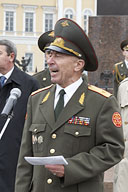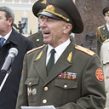
North Ossetian-born General Appointed to Head North Caucasus Military District
Publication: Eurasia Daily Monitor Volume: 7 Issue: 15
By:

In continuation of our last article on Russia that summed up the year 2009 in the North Caucasus (www.jamestown.org/single/?no_cache=1&tx_ttnews[tt_news]=35895), it is worth mentioning that Dmitry Medvedev has drawn his own conclusions as well. Russia’s president ordered purges in the top military command, firing two high-ranking generals: General Vladimir Boldyrev, commander of Russia’s ground forces, and Colonel General Sergei Makarov, commander of the North Caucasus Military District. They were replaced, respectively, by Colonel General Aleksandr Postnikov and Lieutenant General Aleksandr Galkin (https://newsru.com/russia/13jan2010/generaly.html). The deputy chairman of the State Duma’s Defense Committee, Mikhail Babich, believes that this move is designed to remove those Russian generals who opposed the implementation of reforms in their military units (Interfax, January 14).
No matter how one looks at the situation it appears to be more than just a routine reshuffling. Both individuals were among those appointed during Vladimir Putin’s presidency, which cannot be a simple coincidence. President Medvedev, who came to power with Putin’s help, is a man without a team. He was Putin’s protégé and it appears as if nothing has changed for him since his arrival in the Kremlin. That is why one may look at it as at Medvedev’s attempt to appoint his own people to the upper ranks of the Russian military.
This is true not only for the army. One may see the creation of a new position of “chief” of the North Caucasus, which was invented by Medvedev, as his attempt to create a counterweight to the position of permanent representative to the Southern Federal District and as a hint that Putin’s reform of the federal districts during his presidency was unsuccessful. The former Russian president created a structure of federal districts as opposed to the numerous local officials of the republics, oblasts, territories, etc. He tried to unite 88 federal entities under the roof of just seven federal districts, in which his acolytes were supposed to play the roles of “vice-consuls.” Ten years later, it turns out that those vice-consuls could not diminish the desire of the local functionaries to communicate with Moscow directly, bypassing the permanent representatives of the federal districts.
Lieutenant General Aleksandr Galkin, who was appointed to the position of commander of the North Caucasus Military District, was born on March 22, 1958 in the city of Ordzhonikidze (now Vladikavkaz) in the North Ossetian ASSR (Autonomous Soviet Socialist Republic). After graduating from the Ordzhonikidze High General Command School in 1979 he served in the Soviet Army contingent in Germany and then in the Far East Military District. He was decorated with orders and medals. Galkin is married and has two sons (https://osinform.ru/18994-komanduyushhim-skvo-stal-urozhenec-vladikavkaza.html).
This is the first time in the many years of military confrontation in the North Caucasus that a lieutenant general has been appointed to the position of head of this military district. Prior to Galkin’s appointment, the district was headed only by colonel generals. It now appears as if the Kremlin is betting on Aleksandr Galkin. He is the second regional native to have been used to counteract the militants in the past ten years. The first was Colonel General Gennady Troshev, who was born in the city of Grozny. Troshev was in command during the battles for Grozny in the Second Chechen War of 1999. The choice of regional natives could very well be a ploy to appease the local political elites. This is especially true for the Ossetian elite who, under Moscow’s pressure, were forced to make concessions toward Ingush refugees, the majority of whom were unable to return to their homes after the 1992 conflict. In any case, there is little hope that the new commander will be more familiar with the situation in the region.
According to Komsomolskaya Pravda, an edict is being prepared regarding the relegation of the commander of the North Caucasus Military District’s 58th Army, Anatoly Khrulev, to the reserves. He will turn 55 in June of this year (www.nr2.ru/policy/26974.html). The discussion concerns three generals who fought in Tskhinvali, South Ossetia. It is unlikely to be a simple coincidence, given that this punishment could have been foregone for generals so highly decorated for their role in the “victorious” war in Georgia, unless Medvedev is trying to demonstrate that he does not intend to maintain underlings who are ready to fight for Putin.
Another theory, put forward by sources quoted by Kommersant, is that the chief of staff of the Armed Forces of the Russian Federation, Nikolai Markin, is thus clearing the way for his own personal appointees as he progresses to the cherished position of Russian Defense Minister (www.og.ru/news/2010/01/14/46754.shtml).
All of this is happening against the backdrop of disturbing news from the North Caucasus. For example, Deputy Interior Minister Arkady Yedelev announced that the number of crimes committed by the armed opposition in southern Russia in 2009 – 544 – was one and a half times greater than the number of crimes committed by the rebels in 2008. According to Yedelev, most of the crimes were committed in the Chechen Republic (437), followed by Dagestan (44) and Ingushetia (41) (https://www.kavkaz-uzel.ru/articles/164315/). However, these figures are quite questionable given that the number of attacks by militants in Dagestan and in Ingushetia should not have been 10 times lower than in Chechnya. On the contrary, it would seem that in these republics the number of attacks carried out by militants would be higher than in Chechnya. Of course, one could not go without mentioning the “Georgian” mark. Subsequently, the influence of the Georgian security service on the regional situation now has become a popular accusation by Russian politicians.
Yedelev also reported that 235 policemen died and 686 were injured in 2009, meaning that 921 Interior Ministry staffers were incapacitated last year. For now there is no data about the Federal Security Service, but it is safe to say that in any case, the overall loss is more than 1,000 people, which is certainly too high for a country that claims that the North Caucasus appears to be a heavenly corner of Russia.
Thus, Russia is entering 2010 with an anxious look back at the previous year. And it is almost certain that nothing will be changed cardinally, except for a possible upsurge in activity by the armed resistance in the North Caucasus.




